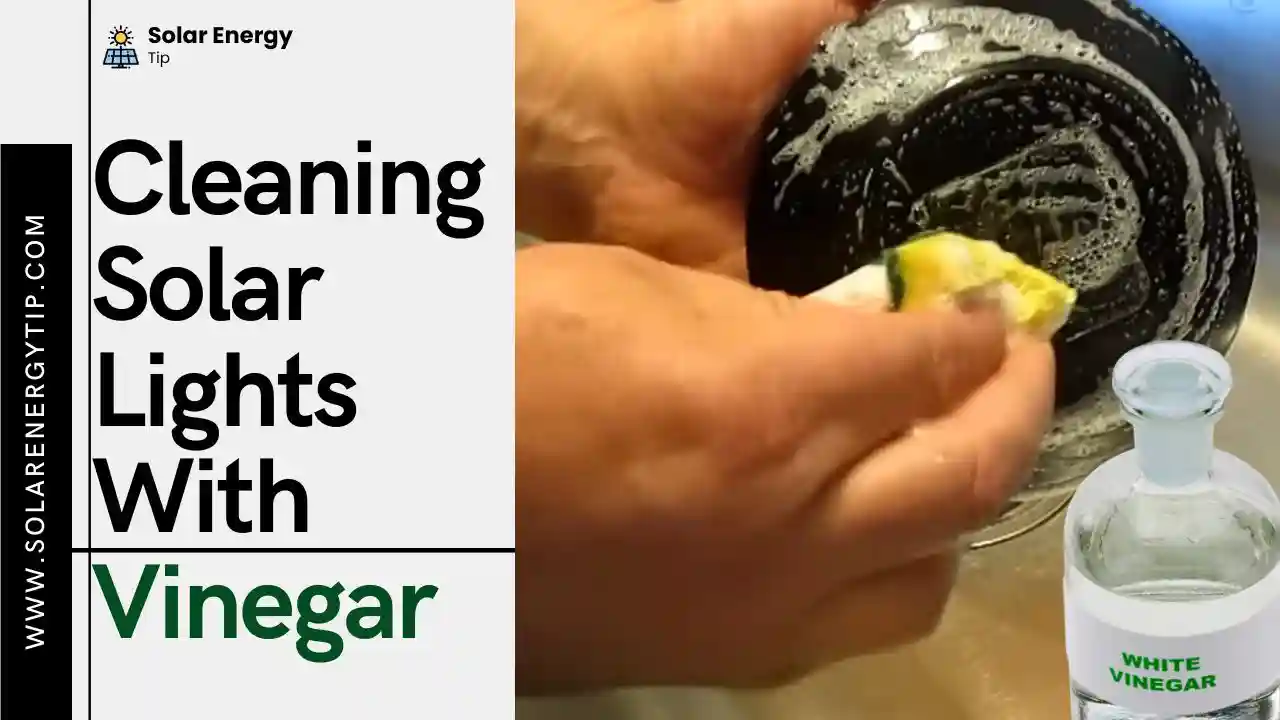You’ve come to the correct place if you want a simple, effective technique to clean your solar lights.
This post will offer the ultimate guide to cleaning solar lights with vinegar more easily and successfully, as well as the benefits of using vinegar.
We’ll also discuss vinegar’s sunlight-cleaning properties. Most kitchens and bathrooms contain natural vinegar.
Many kitchens use vinegar, a cheap, natural cleaner. It can disinfect surfaces.
It cleans solar lights without damaging them. It’s non-abrasive. How can one safely and effectively clean solar lights with vinegar?
This page will give helpful tips and detailed instructions to finish the process quickly. We hope this information helps.
Hence, let’s get started on how vinegar can brighten solar lights.
- What Is Vinegar?
- How to Clean Solar Lights With Vinegar 💦 9 Steps Guide
- 6 Best Cleaning Vinegar For Solar Lights
- Why Use Vinegar To Clean Solar Lights?
- What Kind Of Vinegar Should I Use for Cleaning Solar Lights?
- How Much Vinegar Should I Use?
- How Long Should I Leave The Lights To Dry After Cleaning With Vinegar?
- Should I Use Other Ingredients With My Vinegar Solution For Cleaning Solar Lights?
- Faqs
- Final Words
What Is Vinegar?
Vinegar has been used for thousands of years to cook, treat, and clean. It has been used since antiquity. Its adaptability has made it useful in many circumstances. Bacteria that make acetic acid from ethanol produce a vinegar-like material.
Alcohol ferments into acetic acid, which gives vinegar its astringent taste and smell. Acetic acid also converts alcohol into it.
The most prevalent vinegar is Below.
- White Vinegar
- Apple cider Vinegar
- Balsamic Vinegar
- Red wine Vinegar
- Rice Vinegar
Other kinds of vinegar exist. Vinegar has many forms.
Each variety has a unique flavour and many uses.
Apple cider vinegar is used in the kitchen and as a natural remedy, whereas white vinegar is used for cleaning.
White vinegar is a great way to clean your outdoor solar lights.
For that, here I suggest an excellent type of white vinegar as follows.
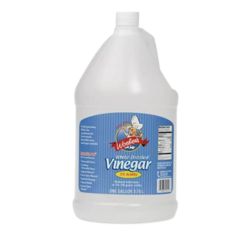
Distilled Vinegar 1 Gallon
- Perfect Performance
- Value is comparable
- Great value
How to Clean Solar Lights With Vinegar 💦 9 Steps Guide
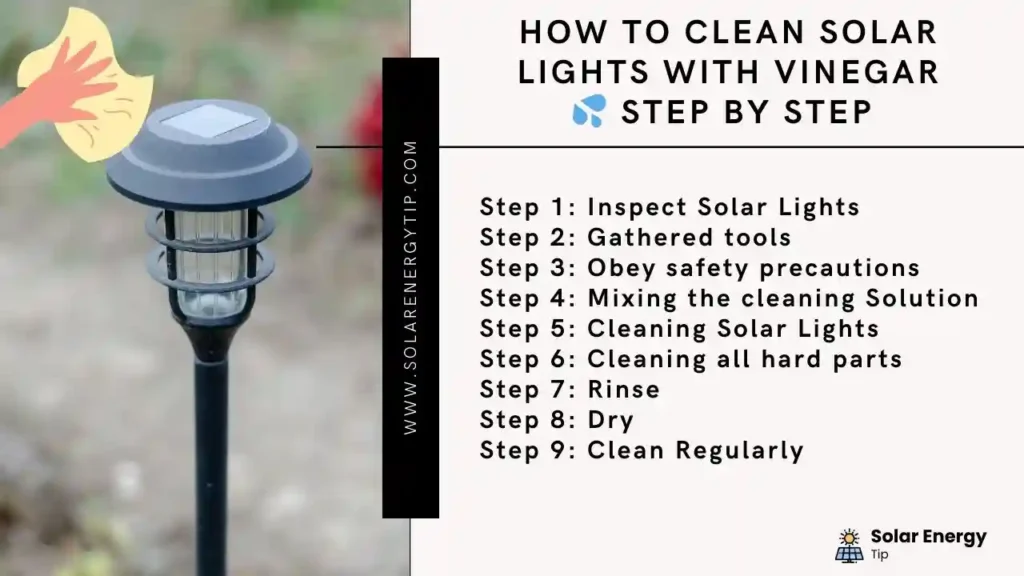
Cleaning solar lights with Vinegar is easier than it seems. Most supermarkets sell vinegar. Vinegar can clean solar lights.
By following a few simple steps in succession, your solar lights can look “as good as new” in minutes.
This detailed method will help you clean solar lights with vinegar. Steps are:
Step 1: Inspect Solar Lights
Before cleaning, inspect your solar lights. After inspecting the item for cracks or loose parts, make any necessary repairs.
Step 2: Gathered tools
You will list all needed tools and supplies in the second stage of cleaning.
- White vinegar
- Soft cloth
- A bucket of warm water and
- Soft-bristle brushes
Step 3: Obey safety precautions
Follow all safety precautions before cleaning. Use gloves and switch off the solar lights before touching them. This protects hands.
Step 4: Mixing the cleaning Solution
Fill a spray container with 1 part of vinegar and 4 part of water and shake firmly to mix. This procedure mixes the liquids.
The recipe must utilize the same amount of each ingredient. Use dish soap to clear stubborn dirt and grime. Several drops should suffice.
Loosened dirt or grime will be easier to remove. Mixing dishwashing liquid into the mixture can do this. One of the numerous methods.
Step 5: Cleaning Solar Lights
After immersing the soft cloth in a cleaning solution, gently wash the solar panels and other light components. After step 4, do this.
Clean the light’s components, including the solar panels, before storing them. To avoid irreparable damage, avoid getting water into the light.
Step 6: Cleaning all hard parts
To clean hard-to-reach spots, use a soft-bristled brush or a toothbrush dipped in vinegar to scrub gently in circles.
Solar lights at higher elevations require a ladder.
Step 7: Rinse
Involves rinsing the solar lights with new water to eliminate any remaining vinegar solution.
Step 8: Dry
After drying the lights with a microfiber towel, replace them where they were.
Step 9: Clean Regularly
Clean your solar lights every six months to a year to keep them bright. Solar light usage determines cleaning frequency.
Read More: Top Solar Uplights for your house or garden
6 Best Cleaning Vinegar For Solar Lights
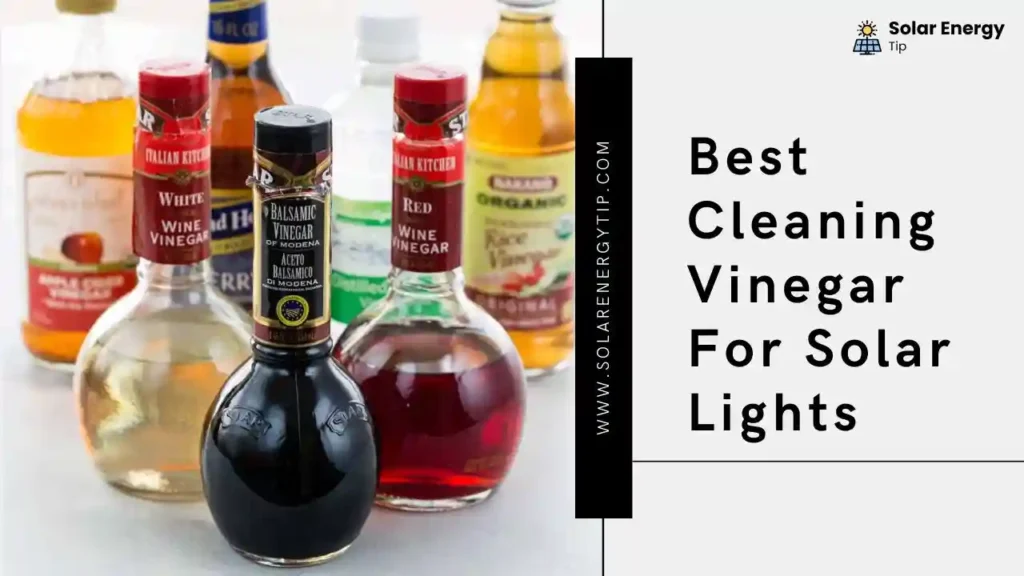
The six types of cleaning vinegar listed below come highly recommended, along with the percentage of acetic acid that each one contains:
| Cleaning Vinegar | Acetic Acid Percentage | More Details |
|---|---|---|
| Woeber’s 5% White Vinegar | 5% | Check Today’s Offer |
| Heinz Cleaning Vinegar | 6% | Check Today’s Offer |
| Lucy’s Family Owned | 10% | Check Today’s Offer |
| Green Gobbler Vinegar | 10% | Check Today’s Offer |
| Four Monks Cleaning Vinegar | 6% | Check Today’s Offer |
| Mrs. Meyer’s Clean Day | 5% | Check Today’s Offer |
Vinegar’s cleaning effectiveness sometimes must be attributed more to its acetic acid content. Remembering this is crucial.
The type of cleaning job, the quality and purity of the vinegar, and many other factors can affect the outcome.
Why Use Vinegar To Clean Solar Lights?
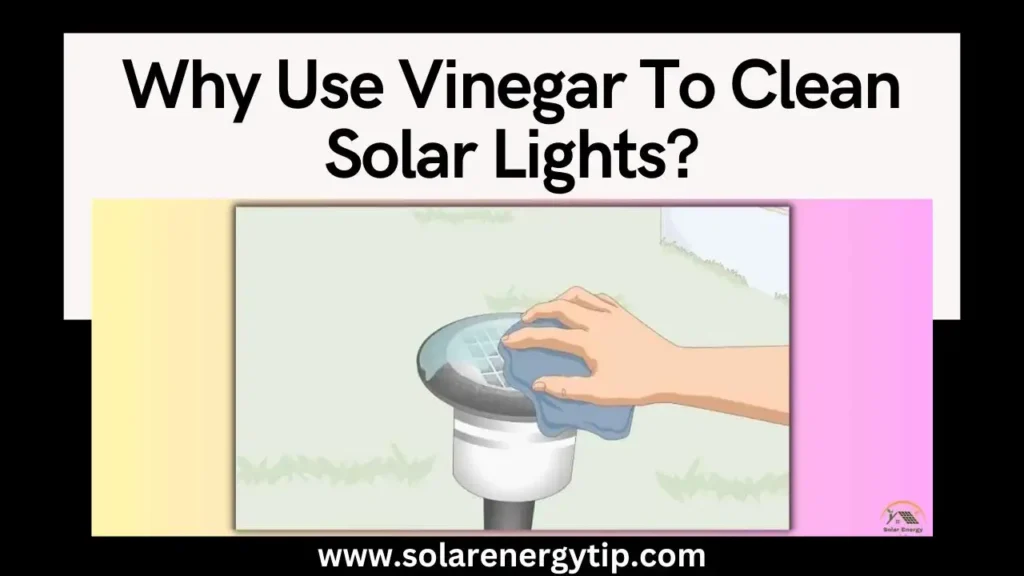
Vinegar cleans solar lights without harming them. Being an acid, it dissolves dirt and grime, making it easy to clean surfaces.
Vinegar cleans solar panels well since it is non-toxic, antifungal, and biodegradable. So, It is the safest and most eco-friendly way.
Solar lights are eco-friendly and give ambience to outdoor spaces. Try putting these lights on today.
Solar lights have numerous uses. But, if dirt, dust, or other substances block them, your solar lights will not work correctly.
Many factors can cause this. These may not function. The mixture gets vinegar now.
Benefits
Benefits of cleaning solar panels of lights. Vinegar-cleaning solar lights have many benefits.
What Kind Of Vinegar Should I Use for Cleaning Solar Lights?
White distilled vinegar cleans solar lights best. White distilled vinegar is used for cleaning due to its acidity. White distilled vinegar removes dirt, grime, and minerals from surfaces.
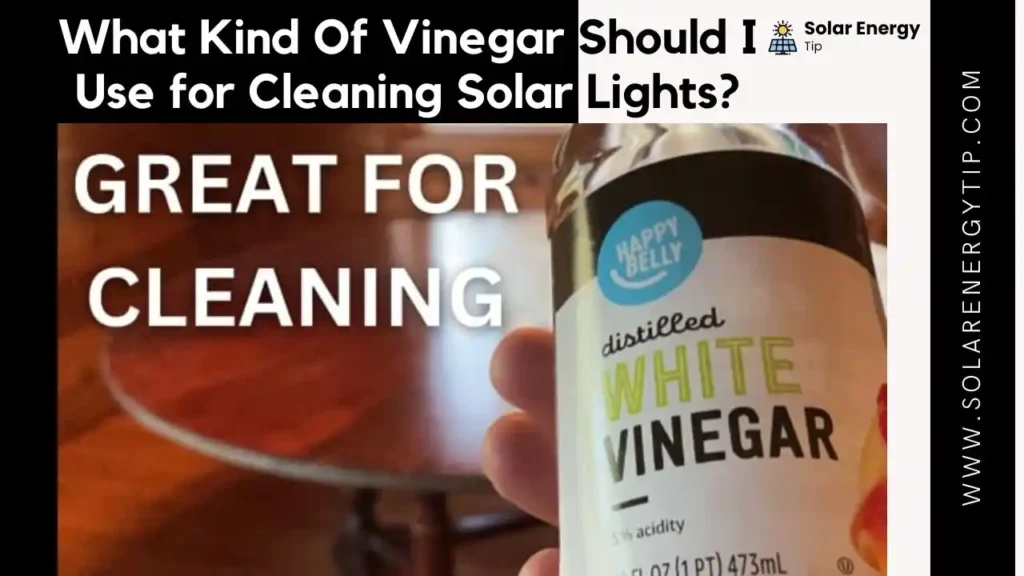
White distilled vinegar, manufactured from grain and transparent, is most commonly used for cleaning. Most vinegar is white distilled.
This vinegar, with a pH of 2.4, may clean solar lights by removing dirt, filth, and mineral buildup due to its extreme acidity.
Apple cider vinegar can also be used to clean solar lights. Apple cider vinegar is fermented.
Apple cider vinegar, with a pH of 5 and less acidity than white distilled vinegar, cleans solar lights well.
Despite its lower pH, it is. Unlike white distilled vinegar, it has a slightly sweet scent. You may enjoy this change.
Clean solar lights with white vinegar only. This procedure should not use balsamic or red wine vinegar. Due to their acidity or darkness, several kinds of vinegar may damage or discolour solar lights.
Use white distilled or apple cider vinegar to clean solar lights. This vinegar always works well.
How Much Vinegar Should I Use?
Measure the dirt on your solar lights to estimate how much vinegar you need. Using 1 part of vinegar and 4 part of water should clean solar lights. Both elements should be similar.
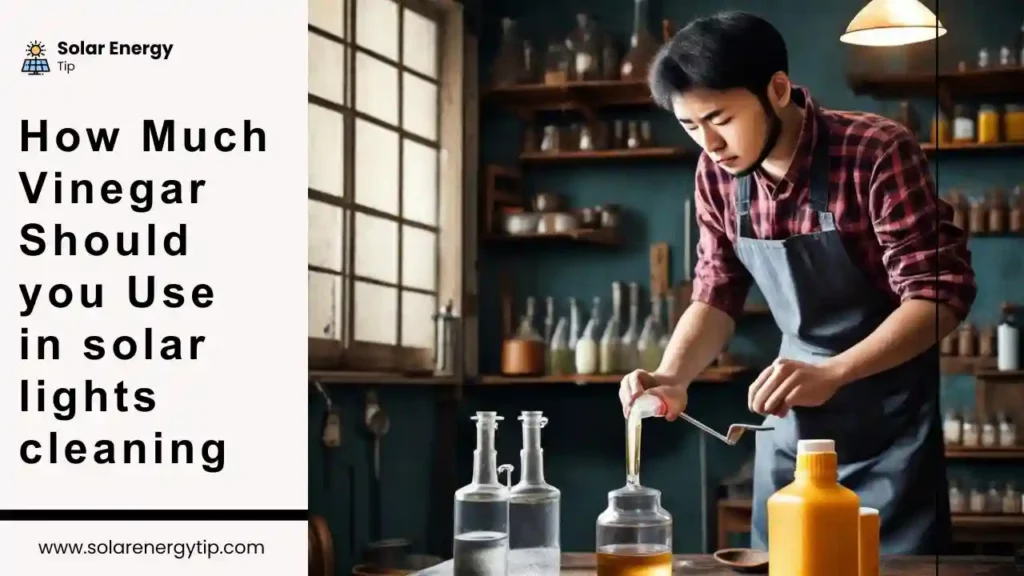
The amount of vinegar needed to clean solar lights with vinegar depends on their size and the amount of dirt or grime on them.
Use a spray bottle to apply vinegar on little lights or dirt accumulations. This approach cleans light dirt well.
If the lights have more debris or larger bulbs, soak them in the vinegar solution for longer before cleaning and rinsing. See how long the accumulation dissolves in vinegar.
Remember that too much vinegar might corrode or discolor solar lights.
Always remember this. Hence, you must use the proper amount of vinegar for each cleaning task.
Start with a bit of vinegar and add more if needed if unsure.
This prevents vinegar overuse. Use gloves and glasses, and operate in a well-ventilated location when working with vinegar. Vinegar can irritate the skin and eyes.
How Long Should I Leave The Lights To Dry After Cleaning With Vinegar?
The solution is easy: just put the lights somewhere they can get some air for half an hour. This method permits the vinegar to evaporate completely, clearing the lights of any remaining residue.
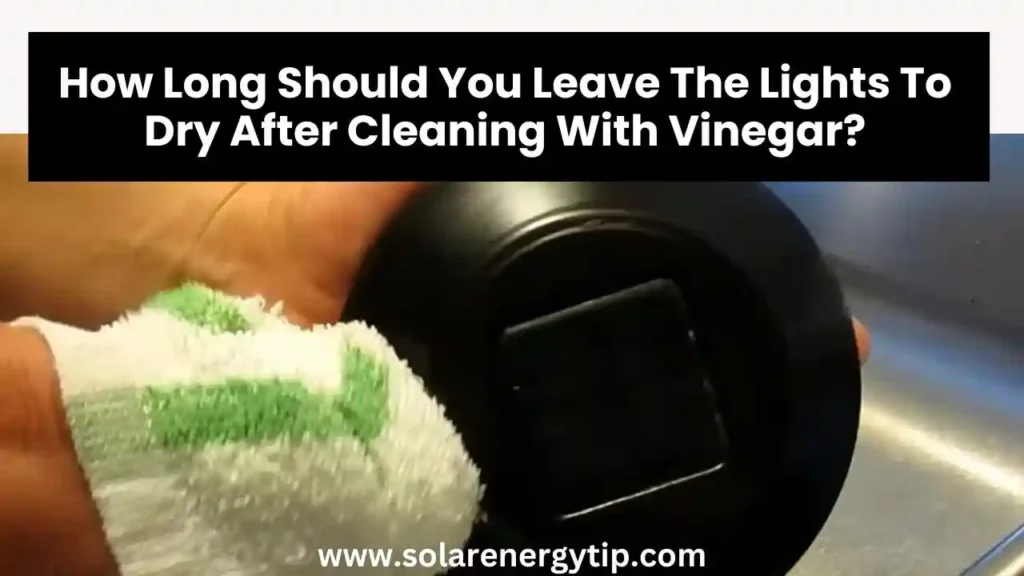
Before turning on solar lights cleaned with vinegar, let them dry fully. Waiting prevents light damage.
This protects electrical components and keeps lights working. Moreover, this prevents power outages.
The lights’ drying period depends on the local humidity and temperature. After cleaning and air-drying, lights should not be used for 24 hours.
If you live in a humid environment or it’s raining, you may need to let the lights dry longer than usual to remove all moisture.
However, in hot and dry weather, the lights may dry faster and be ready to use sooner. You can speed up drying. You may keep the lights outside longer.
To be safe, always let the lights dry longer than necessary. So it’s best to be cautious. It’s best to be cautious whenever feasible.
Should I Use Other Ingredients With My Vinegar Solution For Cleaning Solar Lights?
This is safe and effective. Vinegar has a naturally acidic pH and may clean solar panels by removing dirt and grime.
Vinegar alone can clean solar lights, but adding other chemicals can boost its cleaning power.
Some ingredients suggest adding a tiny amount of dish soap or baking soda to vinegar to make it a more effective cleanser.
Dish soap dissolves thick grime while baking soda absorbs and eliminates odors. Most supermarkets carry these goods.
Yet, excessive dish soap might leave a residue that is hard to wash off.
Lemon juice can replace vinegar in cooking recipes. Lemon juice, like vinegar, is acidic and can clean solar lights.
Vinegar can make it, too. Also, its wonderful perfume can refresh your solar lights.
You can add other ingredients to your vinegar solution. Before applying the answer to your solar lights, test a small area. This ensures the solution will not damage or discolor the lights.
Before adding additional components to your cleaning solution, ensure you’re familiar with the solar panel’s cleaning instructions, and remember to do this. Follow these tips to clean your solar lights safely and effectively.
Faqs
Can I use any vinegar to clean my solar lights?
Instead of other kinds of vinegar, use white distilled vinegar with 5% acidity to clean solar lights. The most often used vinegar for cleaning is safe to use on solar lights and other surfaces.
Apple cider vinegar and red wine vinegar can include chemicals that degrade solar lighting or leave a residue. White distilled vinegar is recommended for solar lights to avoid harm from other vinegar.
How often should I clean my solar lights?
Solar lights should be cleaned at least Four times a year or more often in dusty areas. Clean solar lights last longer and work better.
Solar lights are outdoors year-round, so dirt, dust, and other debris can build up. Cleaning solar lights periodically prevents particle damage. Stick to your cleaning regimen.
Will vinegar damage my solar lights?
No, Vinegar won’t harm solar lights. Vinegar is acceptable for cleaning most surfaces, including solar lights. It’s a gentle acid that cleans solar lights without harming them.
Before applying Vinegar to the entire surface, test a tiny section since solar lights have varied materials and finishes. If Vinegar causes discoloration or damage, switch to an alternative cleaning procedure. Vinegar cleans solar lights safely and effectively.
How do I prevent future dirt buildup on my solar lights?
Clean solar lights work well. Cleaning solar panels and light fixtures prevents dirt buildup. Actions remove dust. Solar lights first. Move them if near dusty gardens. Covered solar lights stay clean.
This prevents dust and harsh weather. Solar light covers are mesh or plastic. Finally, cleaning solar lights reduces grime. Raking or trimming overgrown plants around lights can reduce garbage. These steps maintain solar lights.
Final Words
Vinegar can keep your solar lights clean and glowing for as long as possible. This maximizes your investment.
]Follow this guide to clean and maintain your solar lights for maximum efficiency. This saves money.
Remember that safety precautions and using the right tools and materials are crucial. Always remember this. Don’t forget to tell us how well vinegar-cleaned your solar lights are.

